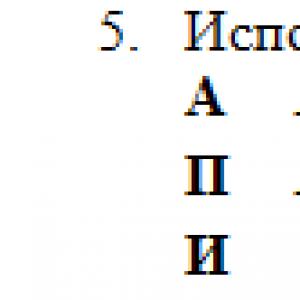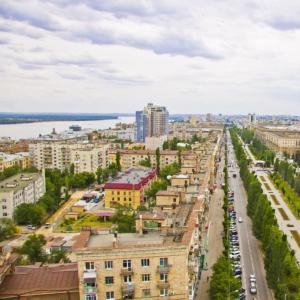The use of the adverb rather in English. Structures had better and would rather to express advice Had better examples
Adverb rather can describe the degree of expression of the adjective or adverb that follows it. In that case rather translated as " enough", "enough". In the same meaning, instead of the adverb rather adverb can be used quite, with the difference that quite may have a positive connotation, and rather– negative. However, both adverbs are interchangeable in most cases.
Use with an adjective:
The film was rather good.
The film was enough not bad.
Use with an adverb:
It happened rather quickly.
It happened enough fast.
Please note
1. The adverb has the same meaning fairly. However rather has a slightly stronger tint. However, the adverb has an even stronger connotation very.
2. Unlike most other adverbs, rather can also be used with a noun:
It's rather a problem.
This represents some problem.
3. Rather can be used with some verbs:
I rather like it.
This is for me in principle (= to some extent) like.
Using rather to express preference
Rather than
In comparative constructions (when comparing two adjectives, adverbs, nouns, verbs, etc.) an adverb rather can be used with conjunction than to express preferences. As a rule, this construction is translated into Russian as " better... than...", "better... rather than...".
For example:
Let's take train rather than the bus.
Let's better let's go by train, and not by bus.
Rather you than me!
Better You, how I!
When the first part of a comparative construction is expressed by an infinitive with a particle to, infinitive after rather than usually used without a particle to. Also in such cases it is allowed to use –ing verb forms.
For example:
I decided to write rather than phone/phoning.
I decided better write a letter, and not call.
Would rather
Design would rather translated as " would prefer/would prefer", "would like to", etc., and is synonymous with the construction would prefer to. After construction would rather followed by an infinitive without a particle to.
For example:
I" d(= I would) rather leave now. (=I" d prefer to leave now.)
I would prefer leave now.
Would you rather stay here or go home? (= Would you prefer to stay here or go home?)
You would prefer stay here or go home?
Would rather + subject + past tense verb
Design would rather can be used to express one person's wishes regarding another person's actions. In this case, you need to use the indicated construction with a verb in the past tense form.
For example:
Don't come today, I would rather you came tomorrow. (= I would prefer you to come tomorrow.)
Don't come today, I would prefer so that you come tomorrow.
I would rather you posted this letter. (= I would like you to post this letter.)
I I'd like to for you to send this letter.
To express actions in the past, you can use a verb in the past perfect tense. In Russian, such a difference is not visible.
For example:
I would rather you hadn't done that. (= I wish you hadn't done that.)
I I'd like to so that you don't do this.
When we say what we would like to do in a specific situation. In this lesson we will look at 2 preference constructs would rather And would prefer, which can be confused, since they have almost same translation. This should not be done, because after would prefer the infinitive is used with a particle to.
- I would rather do = I’d rather do - I’d rather...
- I would prefer to do = I'd prefer to do - I would prefer...
Remember: I would rather = I would prefer = I would like
EXAMPLES
- I'd rather stay home tonight. — I'd rather stay home tonight.
- I'd prefer to stay home tonight. — I'd rather stay at home tonight.
When expressing negation need to add a particle not:
I would rather NOT go out tonight. — I would prefer NOT to leave the house tonight.
You can combine these two designs and get:
I would prefer to stay home tonight rather than go out. — I would prefer to stay at home today rather than go for a walk.
Here's a funny poem Personal Questions, which will allow you to 100% remember how to politely avoid answering an overly personal question.
Personal Questions
Where were you born? - I’d rather not say.
Where are you from? - I’d rather not say.How tall are you? How old are you?
How much do you weigh?
I'd rather not say.How much rent do you pay? - I’d rather not say.
How much do you make? - I’d rather not say.
Why aren’t you married? - I’d rather not say.
Why don’t you have children? - I’d rather not say.
Where were you last night? Why weren't you home?Did you stay out late? Did you come home alone?
Did you have a good time? Did you see a good play?
Did you go to a concert?I'd rather not say. - I would prefer not to talk.
Did you remember How to avoid answering a personal question?- Of course, say - I'd rather not say.
Also, when expressing one’s desires (= preferences), the construction is often used - I would like. Do you remember how it is translated? Test yourself.
Select the correct translation option.
So, I would like translated as I would like, I would prefer. Not to be confused with the expression I like- I like
I like coffee. (I like coffee) VS I would like coffee. (I'd rather have coffee.)
Exercises on Would like to/ Would prefer to/ Would rather
Exercise 1. Tell me what you would rather do. Use the design I would like to and preposition instead of - instead of
Example. James would like to read a book instead of working in the garden. — Jace would prefer read a book instead of work in the garden.
Comment: After a preposition instead of the gerund is placed - working
1. James/ read the book/ work in the garden.
2. Chris / play football / do one’s homework.
3. Jane and Mary / sunbathe / clean up.
4. Laura / watch TB / wash up.
5. Nick and Peter / ride one’s bicycles / play the computer.
6. Mr Robertson /drink tea /make a bird house.
7. Mrs Smith / talk over the phone / cook.
8. Irene / write a letter / go to work.
9. The children / swim / repair the car.
10. The dog / walk about the field / look through the window.
Exercise 2. Now do the same exercise using the structure I'd prefer to…. rather than
Example. James would prefer to read a book rather than work in the garden. — Jace would prefer read a book , not work in the garden.
Modal construction had better expresses urgent advice or obligation to perform an action and is translated as " better», « it would be better», « costs" The design has only one shape had(past tense form of to have) for all persons, but it is used to denote the future and present tense.
Modal construction had better mainly used with the simple infinitive semantic verbs(verbs in the first form) without a particle to.
Past |
Present |
Future |
|---|---|---|
| Should / Ought to Perfect Infinitive |
Had better Simple infinitive |
Had better Simple/Perfect Infinitive |
| You should have done it. You should have done it. |
I had better do it now. I'd rather do it now. |
I had better do it tomorrow. I'd better do it tomorrow. |
| We should n"t have said that. It would be better if we didn't say this. |
You had better not go there. You better not go there. |
We had better have done it till next Monday. We better finish this before next Monday. |
Statement
Affirmative sentences with construction had better mean that from the speaker's point of view, some action must be performed in order to avoid undesirable consequences.
- I had better leave now so I won’t miss my bus.“I better get out now so I don’t miss my bus.”
- It might rain today. You had better take an umbrella.- It might rain today. You should take an umbrella.
- Had better = "d better (abbreviation)
- The train leaves in 15 minutes. She"d better hurry up.– The train leaves in 15 minutes. She better hurry up.
- I had better take a taxi. I don’t have enough time to go there by bus.– I should take a taxi. I don't have time to go there by bus. (no other choice but to take a taxi)
- I would rather take a taxi. It's convenient and I like it.- I'd rather take a taxi. It's convenient and I like it. (personal preferences of the speaker)
Had the best
Design had better in spoken English can be replaced by had best. Both constructions have the same meaning, but had best expresses more gentle and polite advice and obligation than had better.
- You had best stay at my house. It's raining pretty hard outside.- You would be better off staying at my house. There is heavy rain outside.
- I 'd best go to bed now. I'm tired.“I’d better go to bed now.” I'm tired.
- You" d best see your doctor. You look very pale.– You should see your doctor. You look very pale.
What to choose: had better or would rather? And what is there after the apostrophe in the abbreviated form I’d, you’d - would or had? How not to get confused? During grammar intensive lessons via Skype, you can go through all the nuances in detail with a teacher from the English Voyage school in person. In the meantime, a little theory with examples. Like sentences with, the phrases had better or would rather express a hypothetical meaning, that is, an assumed, unreal one.
Had better (not) - better, it would be better
means a better, wiser choice, a suitable alternative in a particular situation. This modal phrase may imply urgency, advice, warning or threat.
For example:
1. Youhad better go now(it would be good, wise or suitable for you to go now).
You better go.
2. If he took your key, you'd better change the locks.
If he took your key, you better change the locks.
3.Your dog had better not dig up my rose bush!
It would be better if your dog didn't dig up my roses.
Had better: use
1. Synonyms had better:
— ought to do something
— should do something.
2. In negative sentences better is put before not.
You had better not go now.
3. The short form ‘d’ is very common. e.g. You'd better - you HAD better.
4. The negative form hadn’t better is mainly used in questions: Hadn't we better change our clothes? “Wouldn’t it be better if we changed our clothes?”
5. Sometimes had is omitted in colloquial speech: e.g. I better try again later.
would rather - would prefer, perhaps
expresses choice and means "would rather do something"
For example:
1.I would rather do it tomorrow.
I'll probably do it tomorrow. (I'd rather do it tomorrow.)
2.I' d rather stay at university than go home now — I need to finish this difficult assignment.
I'd rather stay at the university than go home now - I need to finish this difficult assignment.
3. I'd rather have a snack. (than drink water)
I'll probably have a snack (rather than drink water).
would rather: use
1. would rather = prefer
2. WOULD RATHER + SUBJECT + PAST SIMPLE/CONTINUOUS - we use it if we want someone else did something in present or future.
For example:
I'd rather you didn't go to Spain alone. You better not go to Spain alone. (I'd rather you didn't go to Spain alone.)
3. WOULD RATHER + SUBJECT + PAST PERFECT - used to express dissatisfaction with what someone did in past.
For example:
I'd rather you wouldn't gone to Spain alone. It would be better if you didn't go to Spain alone. (I'd rather you didn't go to Spain alone.)
4. The short form ‘d’ is very common. e.g. I'd rather - I WOULD rather.
Special attention should be paid to the fact that after the phrases had better or would rather the infinitive is used without particles to.
For example:
We' d better go. We better go.
I' d rather stay there. I'll probably stay there.
Hello guys! What's shaking? I hope that everything is fine with you and that you are full of strength and enthusiasm to continue learning English! Tamara and the Puzzle English channel are with you again!
Today on our agenda we have the topic of would rather, would prefer and had better - what is the difference between them and when to use them?
To begin with, they all express preference or advice in one form or another, but in different ways. Let's first look at the constructions would rather and would prefer, and then we will deal with had better.
Usually we translate would rather as “I would prefer, perhaps it would be better,” that is, we express preference for some reason. And before giving examples, I want to note that this construction is used with the infinitive of a verb without the particle to, so be careful!
This is what this construction looks like in a sentence:
I would rather stay at home than go to school.
I would rather stay at home than go to school. (stay is exactly the same infinitive of the verb without the particle to)
By the way, would can easily be shortened and said I’d rather instead of I would rather.
I would rather eat meat than fish for lunch.
I would rather eat meat than fish for dinner.
When we use would rather, it means that we have a choice and we can prefer one thing to another.
But we don't always talk about ourselves. Sometimes we want someone to do something. In this case, the sentence construction scheme will change slightly and will look like this:
Would rather + Subject + Past Simple
Let's look at an example:
I would rather you put on your coat. It's cold outside.
I'd like you to put on your coat. It's cold outside.
I would rather you did this task. I would like you to do this assignment.
If we are talking about the past tense, then instead of Past Simple we will use Past Perfect.
Like this:
He would rather Pam had gone to Italy last summer.
He wishes Pam had gone to Italy last summer.
I would rather you had taken your medicine.
You better take your medicine. (Means took the medicine then - in the past)
What if I need to construct a negative sentence with the construction would rather? How to do it right? Yes, very simple! Just add not after rather. And this is what you get:
I would rather not go outside today. It's too hot.
I'd rather not go out today. It's too hot.
If we want to say that another person should not do something, then we will use either didn’t, or wasn’t, or weren’t. Like this:
I’d rather you didn’t go to the club without me.
I wish you wouldn't go to the club without me.
And if your girlfriend has already gone to the club without you and you want to say that you didn’t like her action, then build your sentence like this:
I’d rather you hadn’t gone to the club without me.
It would be better if you didn't go to the club without me.
Well, I hope you are not very jealous, and yet you will not be angry with her for long!
And we move on! Everything is clear with negative sentences, but interrogative ones are still in the fog. So let's be clear! The proposal construction scheme will be as follows:
Would + Subject + rather + verb infinitive without the particle to
Would you rather eat porridge or pancakes for breakfast?
Would you prefer porridge or pancakes for breakfast?
When there are two subjects in a sentence, we will use Past Simple for events in the present and future and Past Perfect for events in the past:
Would you rather she was honest with you?
Would you rather she were honest with you? (meaning in the present or future)
Would you rather she wasn't honest with you?
Would you rather she wasn't honest with you? (present or future)
Would you rather she had been honest with you?
Would you like her to be honest with you? (in the past)
Would you rather she hadn’t been honest with you?
Would you rather she wasn't honest with you? (here we also mean dishonest in the past)
Well, this is generally the main thing that needs to be said about would rather.
Now let's talk about would prefer. This design is similar to would rather, but it has a slight difference. After the infinitive of the verb, would rather does not have the particle to, but would prefer does.
See:
I would prefer to take a taxi rather than to go on foot.
I would rather take a taxi than walk.
Important note! You can’t just say THAN, you can only say RATHER THAN!
Let's go further:
I would prefer another restaurant.
I would prefer another restaurant.
If we build a negative sentence, it will turn out like this:
I would prefer not to go on foot.
I'd rather not walk.
Well, if we need to ask a question, then we will construct it as follows:
Would you prefer to take a taxi or go on foot?
Would you like to take a taxi or walk?
Would you prefer another restaurant?
Would you prefer another restaurant?
If we want to express a preference for the actions of another person, then we use the following scheme:
Would prefer + object pronoun (me, her, him, it, us, them) + to with verb infinitive
She would prefer us to come as soon as possible.
Or! You can construct the same sentence using a different scheme. Like this:
Would prefer + it if + pronoun + past simple:
She would prefer it if we came as soon as possible.
She would like us to come as soon as possible.
Choose any of these options, you can't go wrong!
These were all affirmative sentences, where there were two subjects, and we still had negative and interrogative ones. So don't relax, friends, let's go!
Negative sentences are built very simply, we just need to add the particle not before to, like this:
She would prefer you not to call her late at night.
She'd rather you didn't call her late at night.
As for interrogative sentences, they are also not so difficult to construct.
First we put would, then the subject, + prefer, then the noun or pronoun, and then to and the infinitive of the verb.
See what happens:
Would you prefer me to read it out loud?
Would you like me to read this out loud?
Would you prefer me to drive a car?
Do you want me to drive?
This is what I would prefer. But we still have the had better design. But we will analyze this construction in the next lesson, so don’t miss it! To check how well you have mastered this topic, follow the link to the Puzzle English website, register and complete the exercise. Tamara was with you, bye!
Hello guys! I hope everyone watched the lesson on would rather, would prefer? If not, watch it first because it's a continuation of that tutorial. Today's lesson will be devoted to the had better construction. Tamara and the Puzzle English channel are with you again!
We use the construction “had better” in the present and future to say that something is desirable and “it would be better” to do or, conversely, not to do in any situation.
When constructing a sentence with had better, we will not use to after the infinitive of the verb, as in the case of would rather. It is also worth noting that in informal speech we use the abbreviation - instead of had- apostrophe d (‘d).
It’s eight o’clock, I’d better go now.
It's already eight o'clock, it's time for me to go.
Had better is a fairly strong expression; we use it when we believe that if something is not done, there may be negative consequences.
That is, we don't use it when we talk about preferences, we use it when we talk about specific recommendations.
Let's now deal with had better in negative sentences. To form one, we just need to add a particle after had. Let's look at a couple of examples:
I'd better not tell her about this.
It's better for me not to tell her about this.
He had better not start this conversation at all.
It's better for him not to start this conversation at all.
Now let's move on to the questions. To ask a question with had better, you need to put had at the very beginning of the sentence. Here's an example:
Had I better speak to Jess first before I send this letter?
Should I talk to Jess first before sending this letter?
It should be noted that such questions are extremely rare. More often, instead of them you can hear a question starting with Should.
Well, we've come to the end! Be sure to listen to this lesson again in a day or two and follow the link to the English puzzle website to do the exercises and consolidate the material you have covered. And Tamara and the Puzzle English channel were with you! See you!







